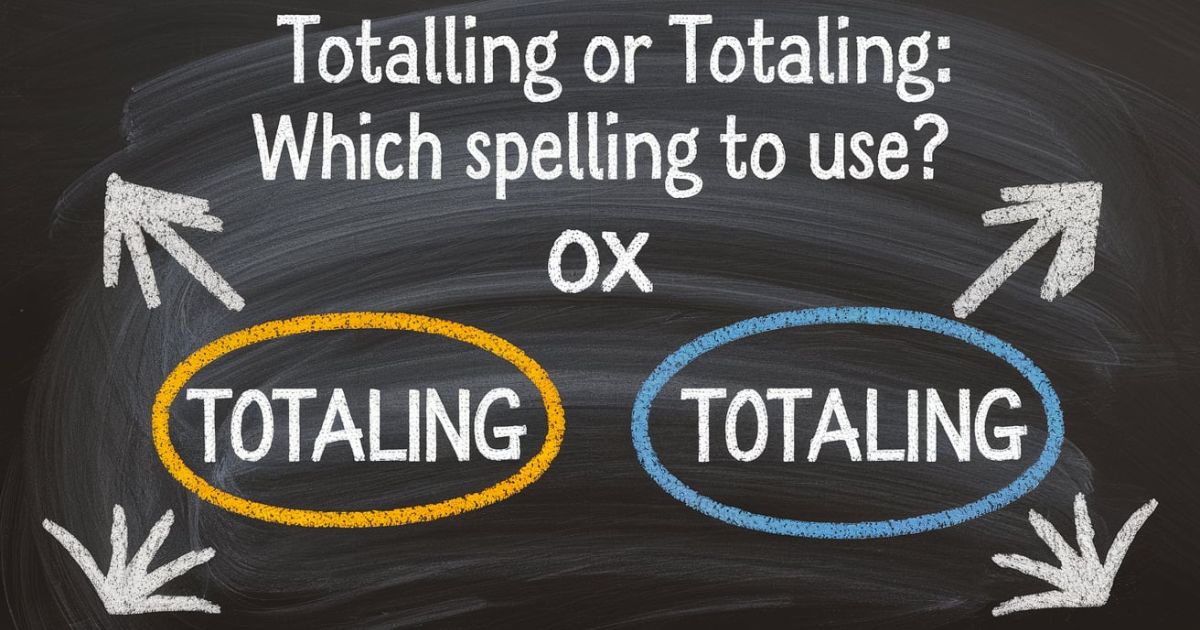If you’ve ever been confused about whether to use “totalling” or “totaling,” you’re not alone. English spelling can be tricky, especially when different countries have their own rules. These two words are a classic example of British vs American spelling, and understanding which version to use depends on where you are or who you’re writing for.
In this article, we’ll dive into the details of the difference between totalling and totaling, providing scenarios where each is used and breaking down the spelling conventions in English that contribute to this confusion.
Definition of Totalling and Totaling
At its core, both “totalling” and “totaling” refer to the act of adding up numbers or calculating a total. They are the present participle of total, meaning they describe an ongoing action, like in the sentence: “She is totalling the receipts from the event.”
Whether you use totalling or totaling depends entirely on the regional spelling differences between British English spelling rules and American English spelling rules.
Totalling Spelling
In British English, the correct spelling is “totalling,” with two L’s. This version follows a consistent rule for verbs ending in a vowel plus a consonant. When forming the present participle (verbs ending in “-ing”), British English typically doubles the final consonant.
For example:
- British English:
- “She is totalling her expenses for the trip.”
- “They are travelling across Europe.”
- “The company is focussing on customer satisfaction.”
The same principle applies to other words like “travelling” and “focussing,” making it easy to see why totalling spelling follows the same pattern.
ALSO READ: What is the Past Tense of See and Its Past Participle?
Totaling Spelling
In contrast, American English spelling rules tend to simplify these forms. In the United States, the preferred spelling is “totaling,” with just one L. The rule here is that when a word has a vowel before the final consonant, you don’t need to double the consonant before adding “-ing.”
For example:
- American English:
- “She is totaling the numbers for the report.”
- “They are traveling to New York.”
- “He is focusing on his studies.”
The logic behind totaling spelling aligns with other streamlined American preferences, making words simpler and faster to write.
Difference Between Totalling and Totaling

The difference between totalling and totaling isn’t about meaning but purely spelling conventions in English. Both words represent the same action, but their spellings depend on whether you’re writing in British or American English.
| Aspect | British English | American English |
|---|---|---|
| Spelling | Uses double “l” | Uses single “l” |
| Regional Preference | Preferred in British English | Preferred in American English |
| Meaning | Means to add up numbers to get a total | Means to add up numbers to get a total |
| Usage | Often used in British English writing | Often used in American English writing |
Here’s a quick breakdown:
- British English: “Totalling” (with two L’s)
- American English: “Totaling” (with one L)
To make this even clearer, let’s look at a few examples where the difference between totalling and totaling comes into play in real-world scenarios:
Business Meeting in London vs New York
Imagine you’re working in London for a company based in New York. You need to prepare a report. If you were writing it in British English, you’d use:
- “The finance team is totalling up the year-end revenue figures.” But in American English, for a New York-based audience, you would write:
- “The finance team is totaling up the year-end revenue figures.”
Both sentences describe the same activity, but the spelling of “totalling” changes depending on your audience’s regional spelling differences.
Travel Blog Post
Now, suppose you’re writing a travel blog. You’ve been keeping track of your expenses during your trip. If your readers are from the UK:
- “I’ve been totalling my costs, and the trip is more expensive than expected!” But if your readers are mostly from the US:
- “I’ve been totaling my costs, and the trip is more expensive than expected!”
This subtle difference showcases how British vs American spelling rules affect even casual writing like blogs.
Origins of the Confusion
The confusion between totalling vs totaling arises from a broader set of rules that govern verb spelling variations in English. These rules vary depending on the country’s linguistic evolution. In the UK, many words retain the older, more complex forms, where consonants are doubled before adding suffixes. This rule applies to words like “total,” “travel,” “cancel,” and “label.”
In the US, there was a movement in the late 19th century to simplify spelling, which is why words like totaling spelling reflect a trend toward minimalism. Americans preferred a simpler approach, reducing the number of double consonants unless absolutely necessary.
British English Spelling Rules vs American English Spelling Rules
When it comes to British English spelling rules, doubling the consonant in words like “totalling” is common when the base word ends in a consonant preceded by a single vowel, and the stress is on the final syllable. The same goes for words like “travelling” and “cancelling.”
However, in American English spelling rules, the trend is to keep the base word intact and only add the suffix without doubling the consonant. This is seen in words like “totaling,” “traveling,” and “canceling.” These spelling rules also follow general patterns for consistency.
Other Words Following Similar Rules:
- Travelling vs Traveling:
- “I am travelling to Paris.” (British)
- “I am traveling to Paris.” (American)
- Cancelling vs Canceling:
- “The concert was cancelled due to rain.” (British)
- “The concert was canceled due to rain.” (American)
The same spelling conventions in English apply across these examples.
Synonyms and Usage Scenarios
Aside from focusing on the spelling, it’s useful to consider synonyms for these words to avoid confusion, especially in international settings.
- Instead of totalling or totaling, you might say:
- “She is adding up the final numbers for the project.”
- “The manager is calculating totals for the monthly budget.”
- “We are summing the figures for the sales report.”
These alternatives are neutral and can be used in both British and American contexts without worrying about spelling confusion in English.
Tips for Totalling or Totaling: Which Spelling to Use?
Here are some unique tips to help you decide between “totalling” and “totaling”:
Consider Your Audience
In British English, “totalling” with two “l”s is the standard spelling, while in American English, “totaling” with one “l” is correct. Know your audience and adjust accordingly.
Follow the General Rule
In British English, when a verb ends in a single vowel followed by a consonant, you double the consonant before adding -ing (e.g., “travel” becomes “travelling”).
However, in American English, you simply add -ing without doubling (e.g., “travel” becomes “traveling”). This rule applies here: “total” has a single vowel followed by a consonant, so in British English, it becomes “totalling.”
Use Context Clues
If you’re unsure which spelling to use, consulting a reputable dictionary can clarify the preferred spelling based on the version of English you’re using. Online dictionaries often indicate regional variations.
Consistency is Key
If you’re writing a document in one style (e.g., British or American), stick to that style throughout. Don’t mix “totaling” and “totalling” in the same piece of writing.
Check Your Spell Checker
Ensure your word processor’s spell check settings align with your intended audience. For example, if you’re writing for a U.S. audience, set your spell checker to American English to avoid confusion.
Proofread for Tone
In formal writing, especially in business or academic contexts, choosing the correct spelling is crucial for maintaining professionalism. In casual writing, like social media, a slight deviation might be more acceptable, but consistency remains important.
When in Doubt, Google It
A simple Google search for “totalling” or “totaling” can yield quick results on common usage and examples. Websites like Grammarly or language forums often provide insights into regional differences.
Consider Related Words
If you are using “total” as an adjective or noun, remember that it remains consistent across both forms (e.g., “the total amount” or “the total cost”). This helps reinforce the spelling you’re using.
Practice Makes Perfect
Practice writing sentences using both forms. This can help reinforce the correct usage and make it easier to remember which form to use in the future.
Stay Updated
Language is always evolving, and spelling conventions can change. Keep an eye on reputable language resources to stay informed about any shifts in usage or new trends.
READ MORE: Pre vs Post: Which Prefix to Use?
Conclusion
In the debate of totalling vs totaling, the answer comes down to geography. The difference between totalling and totaling is based purely on regional spelling rules British vs American spelling conventions. If you’re writing for a British audience, stick with totalling. If your readers are American, go with totaling. Knowing these subtle differences can enhance your writing and ensure it’s suitable for your intended audience.

Osbert is a skilled linguist and educator specializing in English grammar and vocabulary. With years of experience, he has dedicated his career to helping learners enhance their language skills. Osbert is passionate about simplifying complex grammar concepts and is the founder of EnglishInfoz.com, a platform focused on English language education.
